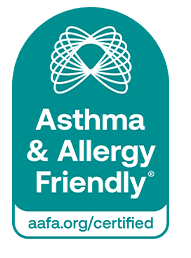We all need to take care of ourselves regularly for physical and mental health. Self-care can apply to seasonal allergies too. Self-care, along with a treatment plan, can help you manage your allergy symptoms and get some relief.
Seasonal allergic rhinitis (“hay fever”) affects about 26% of adults and 19% of children.1 For many people, tree, grass, and weed pollen allergies cause rhinitis symptoms. If you have pollen allergies, where you live may influence your allergy management. In March, the Asthma and Allergy Foundation of America (AAFA) released the 2023 Allergy Capitals™ report, ranking how challenging it is to live with pollen allergies in the 100 largest cities in the continental United States. In the report, we highlighted ways you can practice seasonal allergy self-care.
If you live in an Allergy Capital or deal with seasonal pollen allergies, try these tips:
- Manage your contact with pollen
- Take allergy medicine
- Rinse out your nose
- Talk with your doctor about immunotherapy (allergy shots or tablets)
Manage Your Contact with Pollen
One of the best ways to reduce allergy symptoms is to stay away from your allergen. That’s easy in theory, but pollen can settle on your hair, clothes, and skin, on your pets, and come into your home on shoes and through open doors and windows. You can’t avoid it completely, but you can take these actions to reduce some of your exposure:
- Check pollen counts or forecasts daily and plan outdoor activities on low pollen days.
- Keep windows closed during pollen season or peak pollen times.
- Remove your shoes before entering your home.
- Wipe off furry animals when they come inside or bathe them weekly (if appropriate).
- Dry laundry in a clothes dryer or on an indoor rack, not on an outdoor line.
- Cover your hair, nose, mouth, and eyes while outside.
- Shower before bed to keep pollen out of your bedding.
These are just a few ways to reduce your exposure to pollen. Check out our Allergy Capitals report for more tips.
 Through the asthma & allergy friendly® Certification Program, we have tested and certified products to help you reduce allergens in your home. Making your indoor air healthier may help you as you manage your seasonal allergies. When you are shopping for products for your home, look for the CERTIFIED asthma & allergy friendly® mark. Visit aafa.org/certified to search for CERTIFIED products and learn more about our program.
Through the asthma & allergy friendly® Certification Program, we have tested and certified products to help you reduce allergens in your home. Making your indoor air healthier may help you as you manage your seasonal allergies. When you are shopping for products for your home, look for the CERTIFIED asthma & allergy friendly® mark. Visit aafa.org/certified to search for CERTIFIED products and learn more about our program.
Take Allergy Medicines
Allergy medicine can help you prevent and treat symptoms. And the best part is many options are available without a prescription. Your doctor can help you figure out the best medicines for you. Here are your options for allergy medicines:
Nasal corticosteroid sprays – reduce inflammation (swelling) in the nose and block allergic reactions (Examples include Nasacort®, FLONASE®, and RHINOCORT®)
Antihistamines – pills, liquids, nasal sprays, or eye drops that can relieve sneezing and itching in the nose and eyes (Examples include ZYRTEC®, Claritin®, Allegra®, CLARINEX®, Astepro®)
Decongestants – pills, liquids, nasal sprays, or nasal drops that help shrink the lining of the nasal passages and relieve nasal stuffiness (Examples include SUDAFED®, Vicks Sinex™, Afrin®)
Cromolyn sodium nasal spray – blocks the release of chemicals that cause allergy symptoms, including histamine and leukotrienes (Examples include NasalCrom®)
Leukotriene receptor antagonists (or modifiers) – block the action of important chemical messengers (other than histamine) that are involved in allergic reactions (Examples include SINGULAIR®*, Zyflo CR®, ACCOLATE®)
*Note: Montelukast (brand name SINGULAIR®) has a black box warning. This is a safety warning from the Food and Drug Administration (FDA). This means you need to be aware of a drug’s side effects or important instructions for safe use of the drug. We encourage you to speak with your health care provider before, during, and after the start of any new medicine. If your doctor recommends montelukast, talk with them about possible risks and concerns.
Rinse Out Your Nose
A saline nasal rinse can help you clear pollen and mucus out of your sinuses and nose. You can buy nasal rinse solutions and special rinse bottles at most pharmacies. See our Allergy Capitals report for instructions and a recipe for making your own saline rinse.
Talk with Your Doctor About Immunotherapy
If you still have allergy symptoms after trying the three steps above, ask your doctor about immunotherapy. This is a long-term treatment that changes your body’s immune response to allergens. There are two types of immunotherapy: allergy shots and sublingual immunotherapy.
These are just some of the ways you can practice self-care for your seasonal allergies. See our Allergy Capitals report for more ways to take care of yourself when pollen is high, as well as information on the impact of seasonal pollen allergies on people in the United States.
The 2023 Allergy Capitals report is an independent research project of AAFA and is made possible by a research support grant from the Consumer Healthcare Products Association.
How Can I Learn More About the Report?
The Allergy Capitals™ ranking is an annual research and education project from AAFA. We release the report to help people recognize, prevent, and safely treat allergy symptoms. Through this ranking, AAFA raises awareness about the impact of seasonal allergies. It provides helpful information that can improve the quality of life for people living with seasonal allergies.
Visit allergycapitals.com to see the full list and to learn more about allergy diagnosis, prevention, and treatment.
Join our online community where you can get support for asthma and allergies and stay up to date on news and research.

Comments (0)